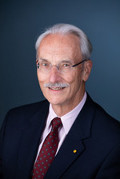Robert P. Hanzlik

Robert P. Hanzlik was born in a working-class neighborhood of Chicago in 1943. He attended local schools, graduating from Harrison Technical High School in 1961. He went on to Southern Illinois University at Carbondale where he double majored in Chemistry and Zoology. After graduating with Honors in 1966, he received an NSF Graduate Fellowship and went to Stanford University to study organic chemistry and enzyme mechanisms under the direction of Professors Eugene E. van Tamelen and Raymond B. Clayton, working on the then-hot topic of enzyme-mediated cyclization of squalene epoxide to lanosterol. After receiving his Ph.D. in 1970, he joined the group of Professor Jack Lewis at Cambridge University as a NATO-NSF postdoctoral fellow where he studied biomimetic oxygenase models. Upon returning to the US in 1971 he joined the faculty of the Department of Medicinal Chemistry at the University of Kansas. He loved teaching pharmacy students and working in the lab with his graduate students and postdocs. During his 49 year career at KU Hanzlik published more than 170 research papers and trained more than 50 graduate students and postdoctoral fellows.
Dr. Hanzlik and his group studied cytochrome P450 reaction mechanisms and the formation and disposition of chemically reactive metabolites. They employed a range of experimental methods including substituent effects, kinetic isotope effects, mass spectrometry, proteomics and bioinformatics. Their focus included identifying reactive metabolites, understanding their binding to tissue proteins, and correlating these interactions with cytotoxicity and organ damage. They published extensively on these topics and made significant contributions to the field. His successful grant applications to NIH enabled KU to build the University Mass Spectrometry Laboratory in 1978, and then later, the Center of Biomedical Research Excellence in Protein Structure and Function (COBRE-PSF), which he directed from 2002 until 2019. He retired in 2020.
Dr. Hanzlik was elected to Fellowship in the American Association for Advancement of Science in 1994 and honored with many awards, including the Sato Memorial International Award from the Foundation for Education in Science and the Pharmaceutical Society of Japan and the Taito O. Soine Award in Medicinal Chemistry. He held national elective offices in the Society of Toxicology, the American Association for the Advancement of Science, and the International Society for the Study of Xenobiotics.
